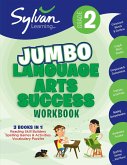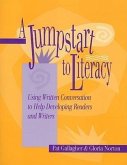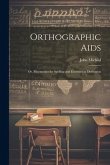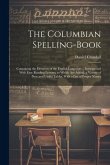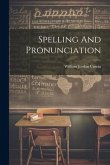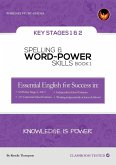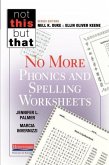- Broschiertes Buch
- Merkliste
- Auf die Merkliste
- Bewerten Bewerten
- Teilen
- Produkt teilen
- Produkterinnerung
- Produkterinnerung
Concerned about the range of vocabulary used by your pupils? Worried about spelling? Jumpstart! Spelling and Vocabulary could be the answer... Full of engaging multi-sensory games and practical suggestions on how to extend your pupils' oral and written word banks and become confident spellers, this resource will soon become an invaluable item in your teaching toolkit. The games cover vocabulary games and spelling activities needed for each year group from year 1 - 7, to build up confidence in children as young writers.
Andere Kunden interessierten sich auch für
![2nd Grade Jumbo Language Arts Success Workbook 2nd Grade Jumbo Language Arts Success Workbook]() Sylvan Learning2nd Grade Jumbo Language Arts Success Workbook17,99 €
Sylvan Learning2nd Grade Jumbo Language Arts Success Workbook17,99 €![A Jumpstart to Literacy A Jumpstart to Literacy]() Pat GallagherA Jumpstart to Literacy33,99 €
Pat GallagherA Jumpstart to Literacy33,99 €![Orthographic Aids; Or, Mnemonics for Spelling and Exercises in Derivation Orthographic Aids; Or, Mnemonics for Spelling and Exercises in Derivation]() John MichôdOrthographic Aids; Or, Mnemonics for Spelling and Exercises in Derivation19,99 €
John MichôdOrthographic Aids; Or, Mnemonics for Spelling and Exercises in Derivation19,99 €![The Columbian Spelling-Book: Containing the Elements of the English Language ... Interspersed With Easy Reading Lessons; to Which Are Added, a Vari The Columbian Spelling-Book: Containing the Elements of the English Language ... Interspersed With Easy Reading Lessons; to Which Are Added, a Vari]() Daniel CrandallThe Columbian Spelling-Book: Containing the Elements of the English Language ... Interspersed With Easy Reading Lessons; to Which Are Added, a Vari22,99 €
Daniel CrandallThe Columbian Spelling-Book: Containing the Elements of the English Language ... Interspersed With Easy Reading Lessons; to Which Are Added, a Vari22,99 €![Spelling And Pronunciation Spelling And Pronunciation]() William Jordan UnwinSpelling And Pronunciation17,99 €
William Jordan UnwinSpelling And Pronunciation17,99 €![Spelling & Word-Power Skills Spelling & Word-Power Skills]() Roselle ThompsonSpelling & Word-Power Skills15,99 €
Roselle ThompsonSpelling & Word-Power Skills15,99 €![No More Phonics and Spelling Worksheets No More Phonics and Spelling Worksheets]() Ellin Oliver KeeneNo More Phonics and Spelling Worksheets36,99 €
Ellin Oliver KeeneNo More Phonics and Spelling Worksheets36,99 €-
-
-
Concerned about the range of vocabulary used by your pupils? Worried about spelling? Jumpstart! Spelling and Vocabulary could be the answer... Full of engaging multi-sensory games and practical suggestions on how to extend your pupils' oral and written word banks and become confident spellers, this resource will soon become an invaluable item in your teaching toolkit. The games cover vocabulary games and spelling activities needed for each year group from year 1 - 7, to build up confidence in children as young writers.
Hinweis: Dieser Artikel kann nur an eine deutsche Lieferadresse ausgeliefert werden.
Hinweis: Dieser Artikel kann nur an eine deutsche Lieferadresse ausgeliefert werden.
Produktdetails
- Produktdetails
- Verlag: Taylor & Francis
- Seitenzahl: 192
- Erscheinungstermin: 31. Dezember 2023
- Englisch
- ISBN-13: 9781138819757
- ISBN-10: 1138819751
- Artikelnr.: 42700051
- Herstellerkennzeichnung
- Libri GmbH
- Europaallee 1
- 36244 Bad Hersfeld
- gpsr@libri.de
- Verlag: Taylor & Francis
- Seitenzahl: 192
- Erscheinungstermin: 31. Dezember 2023
- Englisch
- ISBN-13: 9781138819757
- ISBN-10: 1138819751
- Artikelnr.: 42700051
- Herstellerkennzeichnung
- Libri GmbH
- Europaallee 1
- 36244 Bad Hersfeld
- gpsr@libri.de
Pie Corbett is a bestselling author and educational consultant; well known for his books on teaching creative writing, as well as many other educational books, schemes and anthologies. Pie has also worked extensively in schools as teacher, head teacher and Ofsted inspector. Carol Satterthwaite is an independent literacy consultant and trainer with many years experience in primary education. She designs and delivers tailor-made support and training for schools on all aspects of literacy.
Spelling
* Spelling in writing - why spelling causes problems, where spelling
comes from, plus basic strategies in class, e.g. using a spelling
journal.
* Whole school approaches - ensuring daily routines and practices
across a school.
* Core games - the key games that can be used on a regular basis, by
swapping over the spellings that are being learned, e.g. spelling
doctor (which of these 3 is correct - how do you know - what is the
confusion, e.g. with 'whent' the spellers is muddling 'when' and
'went').
* Key spelling reminders and games per year group - this covers the
basic spelling patterns and exceptions that children should be
learning each year, giving a range of games and activities with
explanations.
* Tuning in games - games for listening / repeating and playing with
sounds - a useful bank of games for children who find it hard to hear
sounds in words.
* Phonic games - a few games for children who still need to use
'sounding out'/ 'segmentation' as a strategy.
* Games for learning tricky words - a bank of games for tackling the
most common errors and problems, e.g. hear/ here, two/ too/ to, etc.
* Learning to 'look' at words - games to strengthen children's visual
memory.
* Morphology - roots and links between words - how words work and are
linked, e.g. ear/ hear/ heard.
* Etymology - where words come from - interesting facts about the
spellings of words and how these came about.
* Spelling rules, reminders and memory joggers - key spelling 'rules'
and their exceptions.
* Spelling strategies - what to do if you get stuck on a word - the
main strategies to use when writing.
* Dictionary games - tuning children into using a dictionary.
Vocabulary
* Word games - games to build a love of language.
* Interesting facts about words - how language grows, strange words and
how they came about.
* Selecting words to teach - words needed for a text type or content
words.
* Making links to spelling
* Introducing new words - strategies for helping children build their
vocabulary bank and retain worlds introduced.
* Building up the bank - helping children become independent 'word
hoarders'.
* Choosing the right word - fine-tuning how to generate vocabulary but
also select which words work best. Creating an effect on the reader.
* Exploring different word meanings - fascinating facts about words,
e.g. homophones.
* 20 interesting things about words - amusing facts.
* Words for characters, settings and plots - gathering word banks for
writing narrative
* Words for informing, persuading and explaining - gathering word banks
for informative writing
* Sayings, expressions and proverbs
* Thesaurus games - learning to make good use of a thesaurus
* Spelling in writing - why spelling causes problems, where spelling
comes from, plus basic strategies in class, e.g. using a spelling
journal.
* Whole school approaches - ensuring daily routines and practices
across a school.
* Core games - the key games that can be used on a regular basis, by
swapping over the spellings that are being learned, e.g. spelling
doctor (which of these 3 is correct - how do you know - what is the
confusion, e.g. with 'whent' the spellers is muddling 'when' and
'went').
* Key spelling reminders and games per year group - this covers the
basic spelling patterns and exceptions that children should be
learning each year, giving a range of games and activities with
explanations.
* Tuning in games - games for listening / repeating and playing with
sounds - a useful bank of games for children who find it hard to hear
sounds in words.
* Phonic games - a few games for children who still need to use
'sounding out'/ 'segmentation' as a strategy.
* Games for learning tricky words - a bank of games for tackling the
most common errors and problems, e.g. hear/ here, two/ too/ to, etc.
* Learning to 'look' at words - games to strengthen children's visual
memory.
* Morphology - roots and links between words - how words work and are
linked, e.g. ear/ hear/ heard.
* Etymology - where words come from - interesting facts about the
spellings of words and how these came about.
* Spelling rules, reminders and memory joggers - key spelling 'rules'
and their exceptions.
* Spelling strategies - what to do if you get stuck on a word - the
main strategies to use when writing.
* Dictionary games - tuning children into using a dictionary.
Vocabulary
* Word games - games to build a love of language.
* Interesting facts about words - how language grows, strange words and
how they came about.
* Selecting words to teach - words needed for a text type or content
words.
* Making links to spelling
* Introducing new words - strategies for helping children build their
vocabulary bank and retain worlds introduced.
* Building up the bank - helping children become independent 'word
hoarders'.
* Choosing the right word - fine-tuning how to generate vocabulary but
also select which words work best. Creating an effect on the reader.
* Exploring different word meanings - fascinating facts about words,
e.g. homophones.
* 20 interesting things about words - amusing facts.
* Words for characters, settings and plots - gathering word banks for
writing narrative
* Words for informing, persuading and explaining - gathering word banks
for informative writing
* Sayings, expressions and proverbs
* Thesaurus games - learning to make good use of a thesaurus
Spelling
* Spelling in writing - why spelling causes problems, where spelling
comes from, plus basic strategies in class, e.g. using a spelling
journal.
* Whole school approaches - ensuring daily routines and practices
across a school.
* Core games - the key games that can be used on a regular basis, by
swapping over the spellings that are being learned, e.g. spelling
doctor (which of these 3 is correct - how do you know - what is the
confusion, e.g. with 'whent' the spellers is muddling 'when' and
'went').
* Key spelling reminders and games per year group - this covers the
basic spelling patterns and exceptions that children should be
learning each year, giving a range of games and activities with
explanations.
* Tuning in games - games for listening / repeating and playing with
sounds - a useful bank of games for children who find it hard to hear
sounds in words.
* Phonic games - a few games for children who still need to use
'sounding out'/ 'segmentation' as a strategy.
* Games for learning tricky words - a bank of games for tackling the
most common errors and problems, e.g. hear/ here, two/ too/ to, etc.
* Learning to 'look' at words - games to strengthen children's visual
memory.
* Morphology - roots and links between words - how words work and are
linked, e.g. ear/ hear/ heard.
* Etymology - where words come from - interesting facts about the
spellings of words and how these came about.
* Spelling rules, reminders and memory joggers - key spelling 'rules'
and their exceptions.
* Spelling strategies - what to do if you get stuck on a word - the
main strategies to use when writing.
* Dictionary games - tuning children into using a dictionary.
Vocabulary
* Word games - games to build a love of language.
* Interesting facts about words - how language grows, strange words and
how they came about.
* Selecting words to teach - words needed for a text type or content
words.
* Making links to spelling
* Introducing new words - strategies for helping children build their
vocabulary bank and retain worlds introduced.
* Building up the bank - helping children become independent 'word
hoarders'.
* Choosing the right word - fine-tuning how to generate vocabulary but
also select which words work best. Creating an effect on the reader.
* Exploring different word meanings - fascinating facts about words,
e.g. homophones.
* 20 interesting things about words - amusing facts.
* Words for characters, settings and plots - gathering word banks for
writing narrative
* Words for informing, persuading and explaining - gathering word banks
for informative writing
* Sayings, expressions and proverbs
* Thesaurus games - learning to make good use of a thesaurus
* Spelling in writing - why spelling causes problems, where spelling
comes from, plus basic strategies in class, e.g. using a spelling
journal.
* Whole school approaches - ensuring daily routines and practices
across a school.
* Core games - the key games that can be used on a regular basis, by
swapping over the spellings that are being learned, e.g. spelling
doctor (which of these 3 is correct - how do you know - what is the
confusion, e.g. with 'whent' the spellers is muddling 'when' and
'went').
* Key spelling reminders and games per year group - this covers the
basic spelling patterns and exceptions that children should be
learning each year, giving a range of games and activities with
explanations.
* Tuning in games - games for listening / repeating and playing with
sounds - a useful bank of games for children who find it hard to hear
sounds in words.
* Phonic games - a few games for children who still need to use
'sounding out'/ 'segmentation' as a strategy.
* Games for learning tricky words - a bank of games for tackling the
most common errors and problems, e.g. hear/ here, two/ too/ to, etc.
* Learning to 'look' at words - games to strengthen children's visual
memory.
* Morphology - roots and links between words - how words work and are
linked, e.g. ear/ hear/ heard.
* Etymology - where words come from - interesting facts about the
spellings of words and how these came about.
* Spelling rules, reminders and memory joggers - key spelling 'rules'
and their exceptions.
* Spelling strategies - what to do if you get stuck on a word - the
main strategies to use when writing.
* Dictionary games - tuning children into using a dictionary.
Vocabulary
* Word games - games to build a love of language.
* Interesting facts about words - how language grows, strange words and
how they came about.
* Selecting words to teach - words needed for a text type or content
words.
* Making links to spelling
* Introducing new words - strategies for helping children build their
vocabulary bank and retain worlds introduced.
* Building up the bank - helping children become independent 'word
hoarders'.
* Choosing the right word - fine-tuning how to generate vocabulary but
also select which words work best. Creating an effect on the reader.
* Exploring different word meanings - fascinating facts about words,
e.g. homophones.
* 20 interesting things about words - amusing facts.
* Words for characters, settings and plots - gathering word banks for
writing narrative
* Words for informing, persuading and explaining - gathering word banks
for informative writing
* Sayings, expressions and proverbs
* Thesaurus games - learning to make good use of a thesaurus


